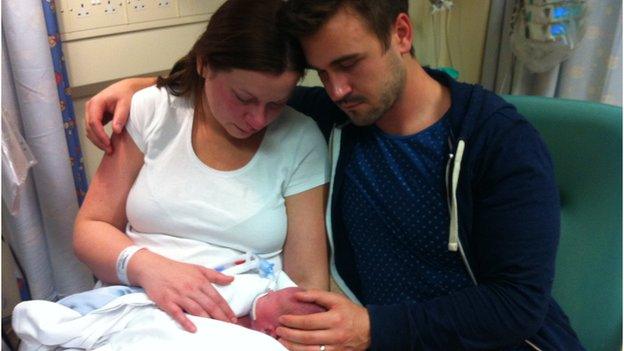Coroner criticises Bedford Hospital after baby death
- Published

Casey Garrett died seven hours after he was born
A coroner questioned whether Bedford Hospital is an appropriate place to train student midwives during an inquest into the death of a baby.
Casey Garrett died from perinatal asphyxia seven hours after his birth at the hospital in September.
Bedfordshire coroner Thomas Osborne said there were "a number of failures" leading up to his birth, resulting in missed chances to deliver him earlier.
The hospital said it had taken action to help prevent a reoccurrence.
A statement said: "We have implemented a range of recommendations to help prevent such a case from happening again in the future. We will continue to undertake further work to ensure these actions are fully embedded."
Casey's mother, Anna Garrett, was admitted to Bedford Hospital on 10 September. Casey was born later that evening but was not breathing.
After being resuscitated, he was transferred to the neonatal unit but later died.
Lack of urgency
The inquest at Ampthill Coroners' Court identified a series of failings, including not monitoring the foetal heartbeat regularly, not recognising his condition was deteriorating and not escalating the level of care so as to expedite his delivery.

Anna and Dean Garrett say they are struggling to come to terms with what happened to their son
"These failures resulted in a lost opportunity to deliver him earlier and avoid his death," Mr Osborne said.
As a result, the coroner said he would be visiting the hospital's chief executive to ensure safe procedures are being adhered to and would also be writing to the body responsible for training student midwives to consider whether the hospital is an appropriate place to train students.
The baby's parents said they felt "very let down" by the hospital and are struggling to come to terms with what happened to their son.
Dean Garrett said: "You put your utmost trust in the team that's providing care and when the standards fall below what you expect it's just shocking.
"However, we feel that Casey's death has been a pivot for change and agree with the coroner that his short life has and will make a huge difference to the safety of patients."